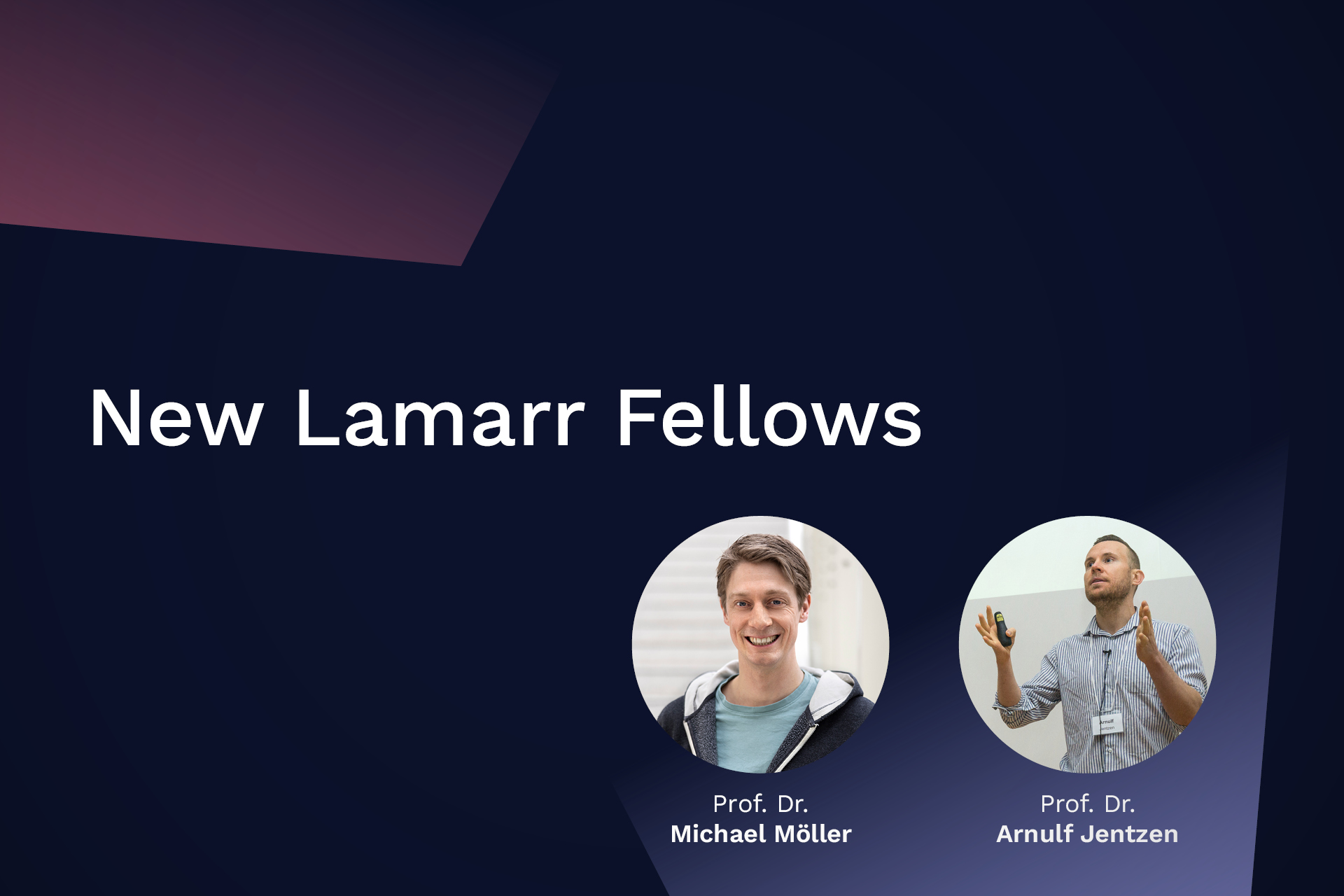
In the second selection round of the “Lamarr Fellow Network Ramp Up”, Prof. Dr. Michael Möller from the University of Siegen and Prof. Dr. Arnulf Jentzen from the University of Münster have been awarded as Lamarr Fellows. The Fellow Network, which already includes Prof. Dr. Barbara Hammer (University of Bielefeld) and Prof. Dr. Axel-Cyrille Ngonga Ngomo (University of Paderborn), is expanded by two more top-tier researchers.
The Lamarr Fellow Network Ramp Up funding program of the Ministry of Culture and Science (MKW) of the state of North Rhine-Westphalia (NRW) honors internationally leading AI experts from NRW. They can use the structures of the Lamarr Institute at the Bonn, Dortmund and Sankt Augustin locations, become part of a network and receive additional funding for their research projects.
NRW Science Minister Ina Brandes says: “The application of Artificial Intelligence must go hand in hand with the question of ethics. As the state of North Rhine-Westphalia, we are investing in AI research in order to create a counterweight to the large American corporations, for whom ethical issues are not paramount. Our Lamarr Fellows are helping us to make the opportunities offered by Artificial Intelligence – for example in the diagnosis of diseases – available to all people, while at the same time taking into account the risks of this new technology. As new Lamarr Fellows, Prof. Möller and Prof. Jentzen are a great enrichment for our science location North Rhine-Westphalia!”
“With Michael Möller and Arnulf Jentzen, we are expanding the Lamarr network with two leading AI researchers from North Rhine-Westphalia. Their expertise and innovative strength will, in close cooperation with the scientists at the Lamarr Institute, provide novel impulses for the research on Artificial Intelligence and Machine Learning,” says Prof. Dr. Christian Bauckhage, Co-Director of the Lamarr Institute.
Michael Möller contributes Expertise in Computer Vision
 In many applications in medicine, biology, physics and industrial manufacturing, it is not possible to capture a direct image of an object under examination. Instead, data are collected that allow for conclusions to be drawn about the actual image – for example, in computed tomography. As a Lamarr Fellow, Michael Möller, professor of Computer Vision at the University of Siegen, will conduct research on how physical knowledge about measurement processes can be integrated into Machine Learning methods. “I am very excited to contribute to the AI landscape in North Rhine-Westphalia as a Lamarr Fellow with my research in hybrid model and deep learning-based methods for inverse problems!”
In many applications in medicine, biology, physics and industrial manufacturing, it is not possible to capture a direct image of an object under examination. Instead, data are collected that allow for conclusions to be drawn about the actual image – for example, in computed tomography. As a Lamarr Fellow, Michael Möller, professor of Computer Vision at the University of Siegen, will conduct research on how physical knowledge about measurement processes can be integrated into Machine Learning methods. “I am very excited to contribute to the AI landscape in North Rhine-Westphalia as a Lamarr Fellow with my research in hybrid model and deep learning-based methods for inverse problems!”
Arnulf Jentzen researches Scientific Computing
 Arnulf Jentzen is a professor of Applied Mathematics at the University of Münster. His research focus in the field of AI lies on the mathematical analysis and further development of Deep Learning methods. In his project as a Lamarr Fellow, he is primarily concerned with scientific computing. Examples include the control of multicopters and robots as well as the refraction of gas and fluid flows. “In scientific computing, trained artificial neural networks are often too inaccurate. In the project funded by the ministry, we want to construct artificial neural networks with significantly higher accuracies, which can then be used to make better decisions in applications. With its internationally leading experts, the Lamarr Institute offers an outstanding framework for my research group to carry out this project,” says Prof. Dr. Arnulf Jentzen.
Arnulf Jentzen is a professor of Applied Mathematics at the University of Münster. His research focus in the field of AI lies on the mathematical analysis and further development of Deep Learning methods. In his project as a Lamarr Fellow, he is primarily concerned with scientific computing. Examples include the control of multicopters and robots as well as the refraction of gas and fluid flows. “In scientific computing, trained artificial neural networks are often too inaccurate. In the project funded by the ministry, we want to construct artificial neural networks with significantly higher accuracies, which can then be used to make better decisions in applications. With its internationally leading experts, the Lamarr Institute offers an outstanding framework for my research group to carry out this project,” says Prof. Dr. Arnulf Jentzen.
Until September 18, AI scientists at universities in NRW can apply for the third selection round of the Lamarr Fellow Network: https://www.mkw.nrw/lamarr-fellow-network
About the Lamarr Institute for Machine Learning and Artificial Intelligence
The Lamarr Institute is constituted by TU Dortmund University, the University of Bonn and the Fraunhofer Institutes for Intelligent Analysis and Information Systems IAIS in Sankt Augustin and for Material Flow and Logistics IML in Dortmund. It is institutionally funded by the Federal Ministry of Education and Research (BMBF) and the State of North Rhine-Westphalia as part of the German government’s AI strategy.